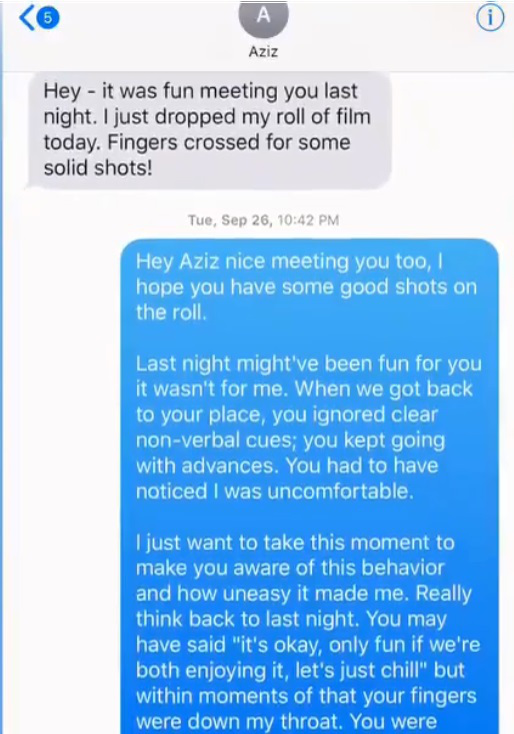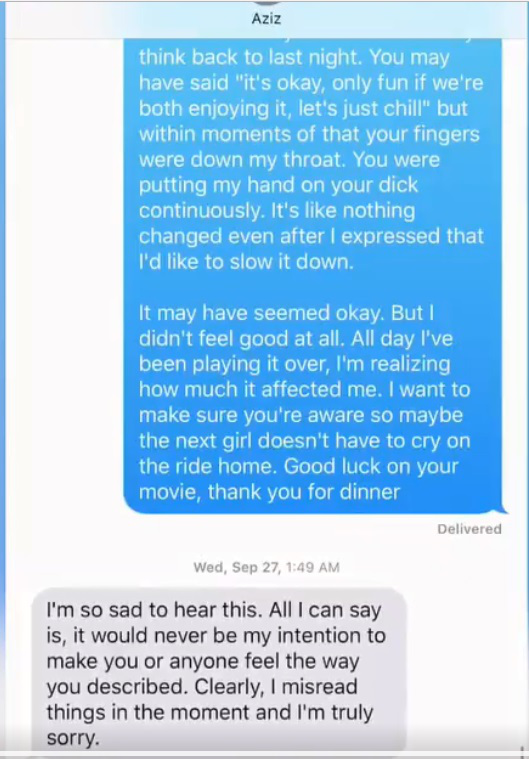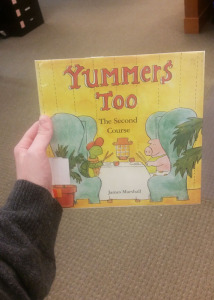Link to account of Aziz Ansari’s sexual misconduct HERE.
Link to response statement from Aziz Ansari HERE.
There is always something to be said for communication. In all of our relationships, romantic, friendly, work-related, communication is the foundation of success. This has been well-researched and exemplified over time. How do we better incorporate communication into interpersonal, sexual experiences to resolve issues of comfort and general awkwardness? This, too, has been researched and discussed at length. The recent account of Aziz Ansari’s sexual misconduct has made me think how we, as individuals, approach these situations.
It is common to hear stories of parents teaching their children about sex using euphemisms, or recounting tales of animals or insects interacting with plants or the world to produce a pleasurable, albeit convoluted, outcome. Flowers blossoming, honey-suckling, and other such nonsense. Approaching a sensitive topic with a lack of forthrightness creates a more confusing landscape than is necessary. But this is what most of us are working with: a confusingly awkward platform of information that doesn’t prepare us (male or female) to deal with sexual conversation. Many of us are taught not to talk about these things, if not directly then from the lack of communication on the topic of sex throughout our childhoods. This becomes the norm.
I have read the articles linked above, and many of the comments made in response on social media. “Grace” is the pseudonym given to the young woman who went on a date with Aziz Ansari in September of 2017 and then shared the events of that evening, in much detail, with Babe. I encourage everyone to read both (generally we should always return to direct source material before analyzing information or attempting to state opinions). In summation: Grace and Aziz met at a party. Before leaving they exchanged numbers. Grace details at length her excitement to be going out with him and how she prepared for the evening. She meets Aziz at his place and they share some wine. They go to a restaurant within walking distance of his apartment. She describes his behavior as rushing them through the meal and ushering her back to his place. Her description does not include any conversation of the sexual potential of their encounter. Once back at his apartment, he begins kissing her and performing oral sex on her. There then proceeds a back and forth that is difficult to read, but not due to the slightly graphic nature. For me, the lack of transparency, the lack of discussion of expectations, is painful to see laid out.
The most confounding issue is not Aziz’s behavior (I would expect the same from most men I know), or Grace’s (I have personally had awkward encounters with “creepy” guys where the situation escalated quickly and my brain had to play catch-up) in this situation. It is her decision to publicly humiliate Aziz for the sole purpose of personal vindication after seeking public validation from her friends and associates that his behavior constituted sexual assault (this almost stated verbatim in the Babe article). The day after their encounter, in which Aziz did misinterpret the situation and behave poorly, Grace describes to him how his actions made her feel. He responds with a succinct, and seemingly sincere, apology, including acknowledging how he misread the situation.


I am not at all stating that he should not have to own up to his personal actions, nor am I suggesting the responsibility to navigate these scenarios lays entirely with Grace (or women in general). But, what was the opportunity for progress here? Grace laid out the scenario fairly well for Aziz to understand her position, and opened the door for him to assess his personal behavior to make different decisions in the future. It seems like this was successful – even though the only evidence we have is texting.
It is dangerous to change the legal definition of sexual assault in the public sector where perpetrators, based only on perceived guilt, will experience real and long-lasting negative changes, generally against their will. As I said in the previous post, socio-economic consequences are necessary when confronting rape culture (or any systemic structural inequality), as they are often brought about due to a lack of legal recourse. But how far are we, as a society, willing to take this? We need a structured plan of attack, and to evaluate if that plan can functionally include actively destroying individuals the same way, at the same rate, for a vast range of “crimes” on the sexual assault/harassment spectrum.
In the wake of my last blog post, including some time to reflect on my statements and personal beliefs, I would like to offer a basic process flow for addressing sexual misconduct (I am deliberately not using the words “assault” or “harassment” here) before it happens. I will use the topic at hand – the encounter between Grace and Aziz – to demonstrate.
Perhaps this is an over-simplification. But I think we need to start simply and work to change the way we interpret and address sexual encounters as they happen, and the response to allegations of sexual misconduct as they are brought to light.
While it may sound clinical, or “not sexy,” I think as a society we need to establish a common framework, moving forward. We, including myself, cannot continue to play judge and jury in the social courtroom without bringing some rules to the arena. We are opening ourselves up to potentially create more harm than good in the fight for safety and equality. Without establishing expectations and acting accordingly, these issues will continue to happen. Common dialogue can help to diminish awkwardness. I hope. I really don’t have all the answers. Or the power to get enough people to approach these situations differently.
Direct social media response: I saw repeatedly people single out the expectation of using “non-verbal cues” to signify that an individual does not want to have sex, or continue with sexual activity, as being incongruous and ridiculous. Well, I would disagree. Most sexual encounters do not begin with explicit consent – they are entered through the use of non-verbal cues. Why is it acceptable to measure consent with non-verbal cues, but not to assess a lack of it? The logic should be applied consistently. Now, explicit communication is a necessity. And I do not mean for the measurement of whether sexual assault or harassment has occurred, I mean in terms of having a healthy understanding of expectations and ensuring all parties are comfortable with what is happening. This should be the standard, but we are far from that.
It should also be noted that communication between individuals takes time to be fully understood. What I mean is people, as individuals, due to family or social dynamics and expectations, communicate differently. Common language and interests are good foundations, but individuals often make statements that, taken at face value, may not be accurately representative of what they actually mean. Sarcasm is a good, easy example. One person may make a sarcastic comment “yeah, I totally love sushi” and another may not pick up on the sarcasm and assume the speakers really does love sushi. Texting adds another layer to this, including the use of emojis. Miscommunication is common enough. Add to that the hormones produced during sexual encounter and how they can change how we interpret information from external stimuli – this can be a recipe for serious awkwardness and discomfort.
Aziz is another example of an Imperfect Ally (adding to Dave Chappelle). Being an ally does not mean being correct, or agreeing with one another. We can agree with a common goal and want to reach it all while believing there are different routes to take to get there. Aziz Ansari’s Master of None did excellent work in both its seasons addressing issues of gender inequality and harassment. I recommend watching it if you have not seen it (available on Netflix).
(Disclaimer: I have a known tendency to present many thoughts and ideas and skip over details – potentially creating illogical strains of thought. But I am working on it and hoping blogging will be a useful tool in fixing this personal flaw.)
Share this:




